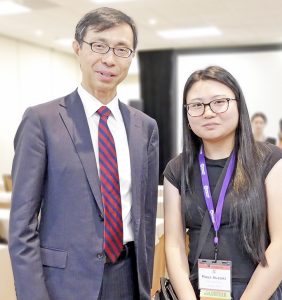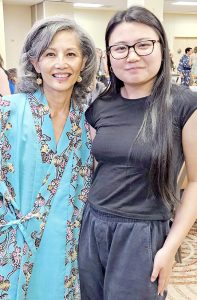A JACL first-timer’s eye-opening perspective of her Philadelphia experience.
By Gil Asakawa, P.C. Contributor
Maya Suzuki is still excited from her trip to Philadelphia to attend the 2024 JACL National Convention, even though she’s back at home now in Hicksville, which is located on Long Island, east of New York City. The 18-year-old is wearing a NY/SC T-shirt from the convention for our Zoom interview and is eager to share her recent experience.
The story she tells is that she went alone to Philadelphia to meet Japanese Americans and found a convention full of “unicorns” — creatures that are legendary and, for her, rare and hard to find.

Maya Suzuki and Minister Masaru Sato of the Japanese Embassy in Washington, D.C. (Photo: Gil Asakawa)
That’s because though Suzuki lived in Queens as an infant before her family moved to Long Island where she was raised by her Shin-Nisei dad and a Shin-Issei mom, Suzuki hasn’t been around a lot of Japanese Americans like the members of JACL. The people of Japanese heritage she has known in her life have been Japanese immigrants or older Japanese Americans who, she says, speak with accents.
Well, everyone except for her great-uncle, Karl Takimoto, who lived in Northern California. Suzuki and her mom visited him before he passed away a few years ago, and she was fascinated to hear him speak — with no accent.
Suzuki observes that JAs like her great-uncle were raised on the West Coast in communities formed by waves of immigrants who arrived as farmers and laborers to escape poverty and famine, while many East Coast JAs, especially in New York City, came to the country more recently as chuzai, expats working for Japanese companies on temporary assignment.
Her mom, who came to America during Japan’s go-go bubble economy of the 1980s, ended up meeting her dad and staying. After Suzuki was born, her mom spoke Japanese to her, and she can slip easily into native-level Japanese at the drop of a hat. She has also visited Japan eight times, so Suzuki is comfortable with both sides of her JA identity.
But her upbringing in suburban Long Island was not in a community of JAs. In fact, she knew only one other kid of Japanese heritage.
Suzuki thinks there are a host of differences between West Coast and East Coast JAs, a topic she’d like to study in college in order to become a professor of Japanese and Japanese American history one day. For now, Suzuki is planning on attending Nassau Community College nearby and has her sights set on transferring to an Ivy League school.
Wanting to educate herself further about JAs, Suzuki Googled “Japanese Americans” and found organizations in New York. She also learned about JACL and realized that its ideals would be the organization for her. She also discovered that there was a national convention coming up in Philadelphia, but she couldn’t afford the registration, so she signed up as a volunteer to attend it. She spent most of her shifts at the registration check-in table.
When she wasn’t signing attendees in, she sat in on panels, board meetings and National Council sessions to learn how JACL works. And to meet people.
She was introduced to the vast national reach of the organization. She also learned about some of JACL’s controversial past, including the support of wartime incarceration.

Tamlyn Tomita and Maya Suzuki (Photo: Gil Asakawa)
And she learned about the concentration camps, and she looks forward to someday going on a pilgrimage to a site. She also met people her age (OK, maybe a couple years older) who organized events for the National Youth/Student Council, a group that first formed in 1966 as the JACL National Youth Program for Sansei leadership development.
In a way, Suzuki has started her own development program by taking the initiative to dive into JACL. While at convention, she met members of the New York chapter, and she hopes to start attending meetings and events in the city.
Suzuki was thrilled to be at the convention because in part it was a tribute to the memory of her Great-Uncle Karl, who she considered a unicorn because he was the only elderly JA she had met who wasn’t like New York JAs who spoke English with accents.
The convention was “very, very interesting — it was like meeting 1,000 unicorns,” she said. “Like when I spoke to Karl, it was like, ‘You’re an older Asian guy with no accent. Oh, my God, like, oh, you’re like a unicorn.’”
“I’d really only ever met one unicorn. And then I walked into this. It was all unicorns. And I was like, whoa. It was meeting people of an ethnicity that I never meet in my daily life. And now I know so many. I show up to JACL and see two unicorns in the lobby over there, and then the National Board and National Council — all unicorns. I can’t meet any where I live. So, it’s so surreal, you know. I went to the convention to prove that they’re real.”
Yes, they are. And Maya Suzuki may soon find that she’s a JACL unicorn herself.
This article was made possible by the Harry K. Honda Memorial Journalism Fund, which was established by JACL Redress Strategist Grant Ujifusa.



